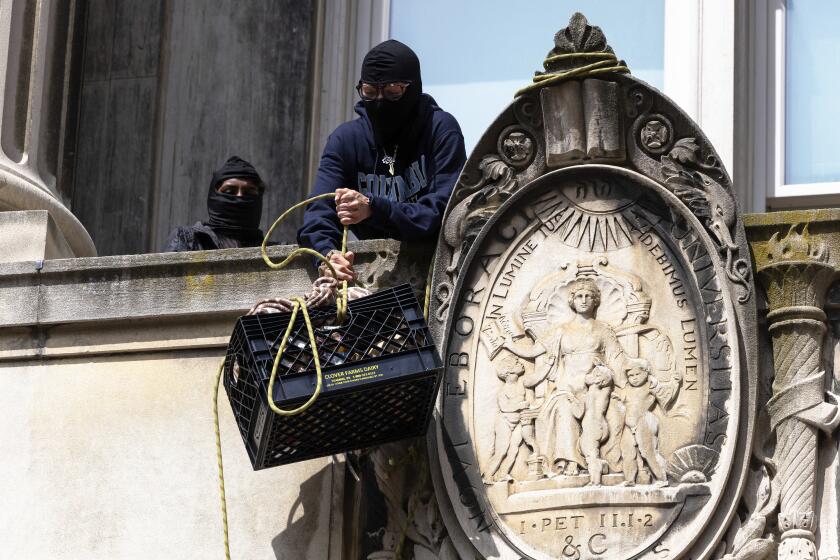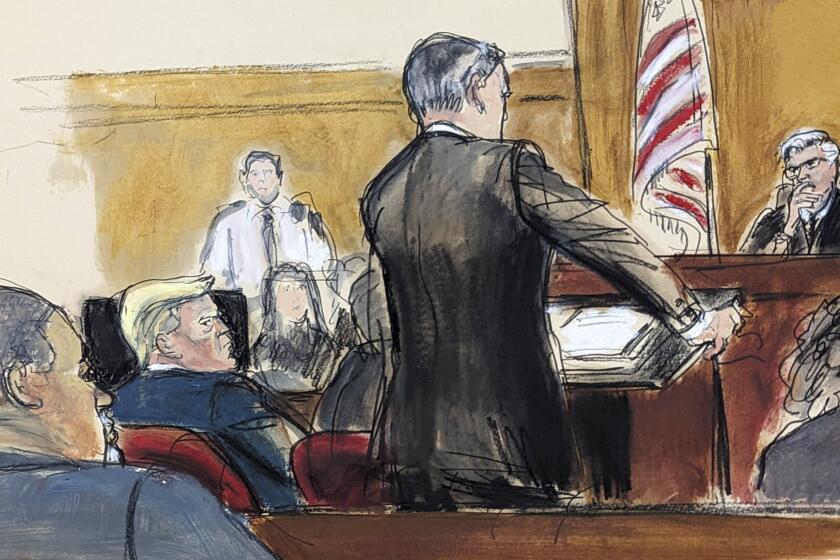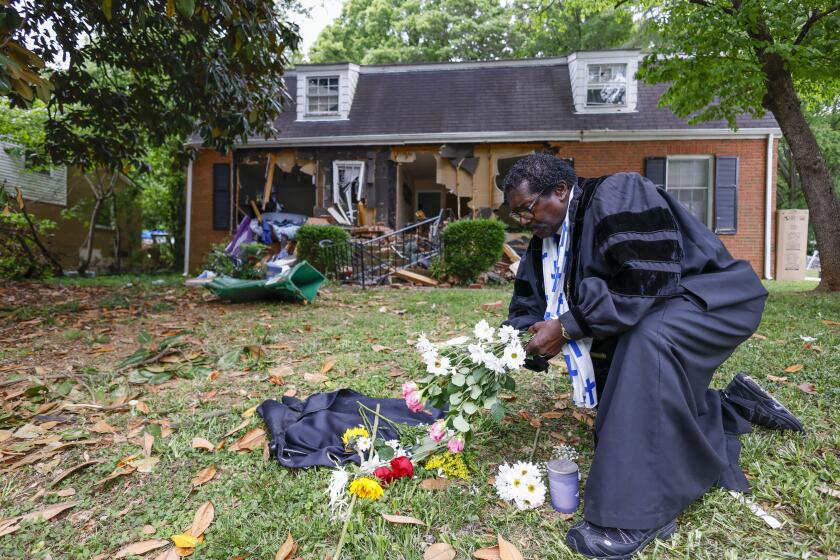Party Dominates, Foes Jailed : China’s Political System a Rock in Tides of Change
Ten years ago, Jiang Qing was one of the most powerful people in China. She was not only the wife of Chairman Mao Tse-tung but also a leading member of the Communist Party Politburo. She dictated standards for Chinese culture and entertained such visitors as Richard M. Nixon and Imelda Marcos.
Now, at the age of 72, Jiang Qing spends her days in Qincheng Prison, near the imperial tombs of the Ming Dynasty northwest of Peking, serving a life sentence as a counterrevolutionary, reading newspapers and watching television.
According to a Chinese source, her meetings with visitors are tape-recorded, transcribed and circulated at Zhongnanhai, the complex in Peking where Chinese leaders live and work.
A couple of years ago, Li Na, the 45-year-old daughter of Mao and Jiang Qing, visited her mother in prison to say she had a new boyfriend.
“Does he know that your father was China’s greatest revolutionary hero, and that your mother is the greatest counterrevolutionary?” Jiang Qing gibed.
In a sense, Mao’s widow is lucky. Chinese officials have acknowledged that she is not required to wear prison clothing, and that she is given pork and fish to eat. She is allowed to remain near Peking.
By contrast, former human rights activist Wei Jingsheng is reportedly imprisoned in the Qaidam Pendi region of Qinghai province, China’s version of Siberia and the site of its most notorious labor camps.
Wei, a young electrician and magazine editor, was China’s most articulate and dedicated advocate for democracy during the 1978-79 period when the regime briefly tolerated political dissent and then suppressed it.
“Does (Chinese leader) Deng Xiaoping want democracy?” Wei once wrote. “The answer is no.”
Wei, too, was convicted as a counterrevolutionary.
There could not be two more different persons than Jiang Qing and Wei Jingsheng. Yet, together they illustrate an important point about life in China 10 years after the death of Mao: The nature of the political system has not changed very much.
Although the past decade has brought about some substantial changes in daily and economic life, and in the leadership and the ideology of the Communist Party, the political structure set up under Mao remains largely in place.
Party Dominates Life
The party dominates all aspects of Chinese life. There are party officials or committees in every factory, every academic department, every neighborhood. Ordinary Chinese must seek approval for virtually every personal decision they make: to have a child, to get an apartment, to move to another city, to change jobs.
The controlling power within the party is held by a small group of leaders who command the support of party elders and the army. Opponents who pose a political threat to the leadership, whether fervent Maoists like Jiang Qing or human rights advocates like Wei Jingsheng, are locked up and silenced.
“China is not significantly more liberal politically than the Soviet Union yet,” Harry Harding, a China scholar at the Brookings Institution, said not long ago in an interview.
Harding said that the important economic changes in China over the last seven years--such as its attempt to move away from central planning toward more reliance on market forces--have created the misperception that there has been some dramatic political liberalization as well since Mao’s death.
Used Soviet Pattern
In 1949, under Mao, China’s new Communist regime modeled party and government institutions on those of the Soviet Union. The political structure that was set up 37 years ago remains largely in place today. The Soviet influence can still be seen at every level of organization, from the Politburo and Central Committee at the top to the party’s propaganda department to the Soviet-style system of academies and research institutes for scholars.
This year, as Tuesday’s 10th anniversary of Mao’s death approaches, Chinese leaders suddenly permitted some discussion about the possibility of reforming the political system.
For example, Tan Jian, a research fellow at the Academy of Social Sciences, told a national conference on government last June in Taiyuan that China’s system of government “was a transplant of the Soviet model of the 1930s, which controlled economic and social affairs with commands from the central government.”
This might be a good system, he said “for winning military and political victories, but it lacks flexibility and so does not suit the development of a modernized, socialist commodity economy.”
So far, however, there has been only talk of political reform and no concrete change.
Last June, the party general secretary, Hu Yaobang, told a press conference in London that there are no political prisoners at all in China. Since the end of the Cultural Revolution 10 years ago, Hu said, “only those who have violated the law are imprisoned.”
Dissidents Can Be Jailed
Under the law, however, a person who challenges the government or socialism can be labeled a counterrevolutionary and jailed as a criminal.
Article 98 of the criminal code permits the authorities to imprison anyone who “organizes or leads a counterrevolutionary group.” And Article 102 makes it illegal to propagandize or incite “the overthrow of the political power of the dictatorship of the proletariat and the socialist system.”
In 1979, at the session of the National People’s Congress at which the criminal code was drafted, a professor suggested adding a provision that would make it illegal to define ideological and political problems as counterrevolutionary activity. The proposal was rejected.
No one knows how many people are in prison for counterrevolutionary activity. Chinese officials refuse to provide numbers.
Three years ago, the president of the Chinese Supreme People’s Court reported to the National People’s Congress that counterrevolutionary offenses made up 0.5% of all criminal cases handled by the courts in 1982, a sharp reduction from the level of previous years. Based on published estimates of the number of criminal cases, that would mean at least 450 trials of counterrevolutionaries in 1982, and many more in earlier years.
The counterrevolutionaries include not only Jiang Qing but a number of others who supported her effort to steer the party toward continuing Mao’s concept of Cultural Revolution after his death.
‘Gang’ Still in Prison
The other three members of the so-called Gang of Four, who were convicted of conspiring with Jiang Qing to seize power, are also still in prison. They are former Shanghai party boss and Vice Premier Zhang Chunqiao, former propagandist Yao Wenyuan and former party Vice Chairman Wang Hongwen.
“We are taking good care of them,” Ruan Chongwu, the minister of public security, said of the Gang of Four in June. “We treat them much better than they treated us.”
Originally, in 1981, Mao’s widow and Zhang Chunqiao were sentenced to death. But two years later their sentences were commuted to life imprisonment. Party leaders such as Chen Yun, a member of the Politburo Standing Committee, argued that their crimes were essentially political in nature and that they should not be executed.
The imprisonment of Jiang Qing and her supporters has effectively silenced any others in China who may still privately subscribe to Mao’s belief in “continuing class struggle.”
Even those more moderate party leaders who argued after Mao’s death that the party should at least generally follow along the lines of Mao’s policies, rather than adopt Deng’s economic reforms, have been relegated to the sidelines of Chinese political life.
If China had American Express card commercials, Hua Guofeng might be considered obscure enough to appear in one. In 1976, Hua was the public security minister named as acting premier by Mao and groomed as his political heir. He served as premier until 1980 but resigned when it became clear that Deng’s forces controlled the party. Now Hua, 65, is simply one of 210 members of the Central Committee.
The ranks of the imprisoned counterrevolutionaries also include a number of activists who, like Wei Jingsheng, have pressed for democracy or criticized the Communist Party more forcefully than its leadership has been willing to tolerate.
15 Years for Ex-Editor
For example, Xu Wenli, the former editor of an unofficial magazine called April Fifth Forum, was sentenced to 15 years’ imprisonment in 1981 for counterrevolutionary activities. Earlier this year, the Chinese Alliance for Democracy in New York City reported that Xu had been placed in solitary confinement after smuggling his memoirs out of prison. Chinese justice and prison officials say only that Xu is in good health.
Last spring, Chinese sources said that six students who took part in a series of demonstrations with anti-government overtones at Peking University the previous autumn had been arrested and taken away. Chinese authorities have confirmed only that two students were arrested on the campus last spring. A government spokesman recently told The Times that their cases are still under investigation and that they have therefore not been brought to trial.
Scholars note that in some ways, at least, China’s political system has eased up since Mao’s death, especially for those who do not pose any direct challenge to the party leadership.
“There’s a sphere of indifference now,” said Harding. “They (authorities) don’t care what you wear, for example, or whether you are religious, or who your friends are.”
But official party newspapers have in recent years published stories alternatively praising or criticizing Western fashions, and loyal cadres have changed their dress habits accordingly. The party shows more tolerance for religious activities for the nation at large, but party members still are generally expected to adhere to atheism.
Non-Party Leaders
The party leadership has also become somewhat more willing to let people who are not party members assume leadership positions, particularly in science and industry. Indeed, under the current economic reform program, the party secretaries who in the past have run factories are supposed to give way to factory managers whose main concerns are efficiency and productivity, not political loyalty. Yet even the official press admits that too many party secretaries have been unwilling or unable to relinquish their power.
Because the party’s role in industry and science has been cut back, the party has found it hard to recruit new intellectuals into its ranks. Under Mao, the party had shown deep hostility to people with formal education; according to 1984 figures, only 4% of the party’s 40 million members have college degrees, while more than half of the party members have no more than an elementary school education.
Now that the party is trying to correct this imbalance by admitting more intellectuals, however, some educated Chinese are turning down the blandishments and privileges of party membership because it is no longer necessary for professional success.
Over the past few months, party leaders have again begun to talk of opening up the political system. The Chinese press has been full of essays by leading scholars praising the virtues of democracy, the right to dissent, and the concept of checks and balances within the political system.
Hopes for Liberalization
Just as on two earlier occasions, in 1956-57 and 1978-79, the ferment has begun to raise some hope that the party will become less autocratic.
“Chinese scholars say that the time is getting ripe for political reform,” two reporters for the government newspaper China Daily wrote last month. “It is better than in 1957, when the country was overrun by windmill tilters. . . . It is better than the years immediately following the end of the Cultural Revolution, when it was vital to readjust international relations and tackle the more pressing economic problems.”
Still, those previous efforts at liberalization failed, and in the past all predictions that China’s political system would operate in a more benevolent way have generally turned out to be wrong.
In June, 1976, the dean of American Sinologists, Harvard University professor John K. Fairbank, said in a Tokyo speech that he thought that after Mao’s death, Jiang Qing might “quietly go to teach school somewhere.” His forecast underestimated how nasty the struggle for power can be in China, and what happens to the losers.
In a recent interview, Su Shaozhi, director of China’s Institute of Marxism, Leninism and Mao Tse-tung Thought, was asked whether the current discussion of political reforms will result in any major changes soon.
Su thought for a moment, and replied: “Political reform is more complicated than economic reform, because it involves the power of our leaders. In Yugoslavia, there was discussion of political reform in the early 1950s, and, as far as I know, it is still in discussion. So this will take time.”
More to Read
Start your day right
Sign up for Essential California for news, features and recommendations from the L.A. Times and beyond in your inbox six days a week.
You may occasionally receive promotional content from the Los Angeles Times.






